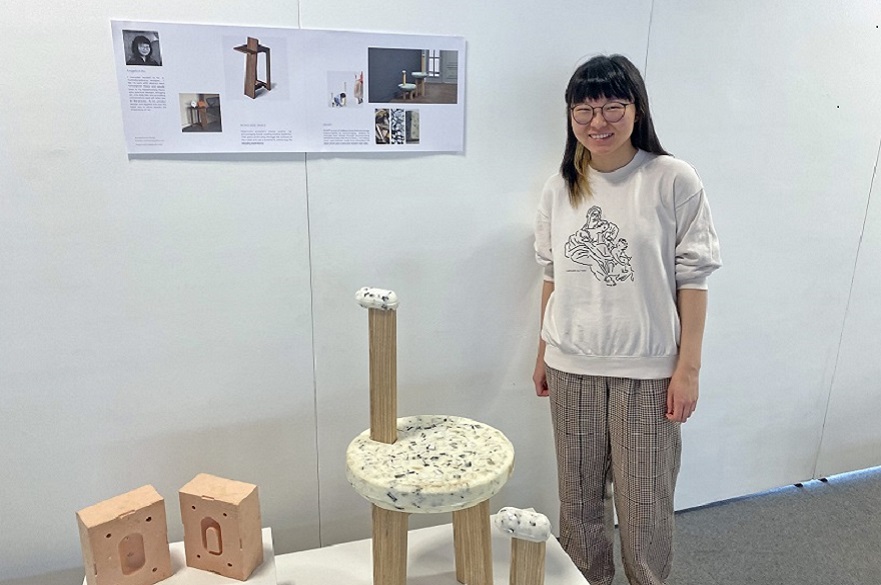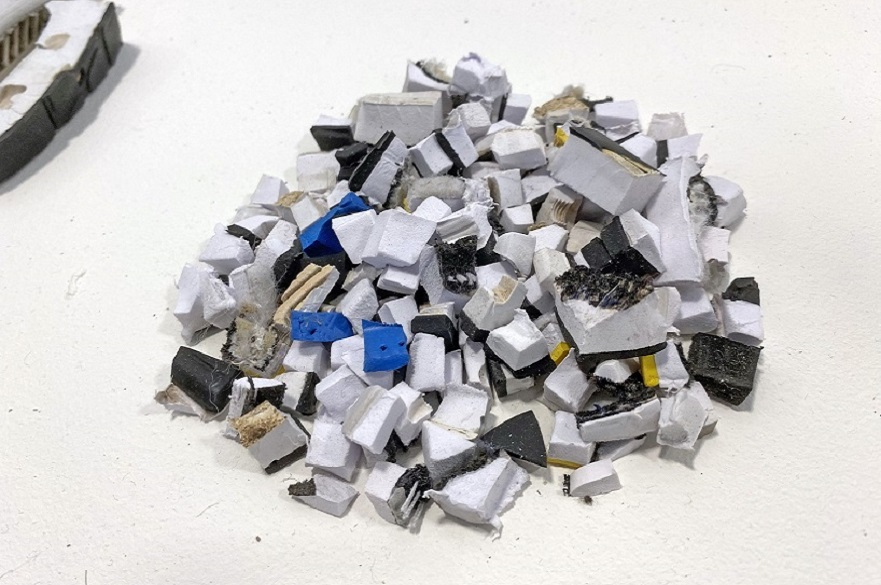Student shows how recycled trainers could be used to make furniture
Old trainers destined for landfill or the incinerator could be used to make furniture, a Nottingham Trent University student has shown.
By Chris Birkle | Published on 1 July 2022
Categories: Press office; School of Architecture, Design and the Built Environment;

Old trainers destined for landfill or the incinerator could be used to make furniture, a Nottingham Trent University student has shown.
Angelica Au, 21, collected 22 pairs of used trainers to help her make the prototype Okapi Stool, which she designed to help young children learn to put their shoes on.
The BA Furniture and Product Design undergraduate found that disused trainers with soles made from ethylene vinyl acetate (EVA) when combined with polyurethane foam, was rigid and durable enough for seating.
“People go through shoes quite quickly, especially if they’re used for sports,” said Angelica, from Hong Kong, who is studying in the School of Architecture, Design and the Built Environment.
“But the problem with trainers is that the fabric wears out before the sole, and not many people want to buy second hand shoes.
“Up to 40 different materials are used in a pair of shoes, which makes it hard for them to be recycled. So I wanted to show how this waste material could be repurposed and made much more sustainable.
“When combined with polyurethane foam, it makes for a durable and rigid material which isn’t too soft. I was pleased to hear that a lot of people say that it’s surprising comfortable to sit on.”

Chopped up trainers ready to become furniture
Named after the mammal found in the northeast Democratic Republic of the Congo, the Okapi Stool features an ash wood frame with a handle to help children maintain their balance while standing to put a shoe on.
Angelica collected the waste trainers from friends and from charity shops which had failed to resell them. She then cut the trainers into small cube-like shapes using machinery and by hand using a sheer. The foam seat – comprising the trainers and polyurethane - was set in a mould for 24 hours.
“I had feedback from parents about what makes it difficult to prepare for school,” said Angelica.
“They say their children can change their shoes but it’s boring for them. So I wanted to make shoe changing fun and interesting, while also giving children more responsibility and independence.”
Angelica’s design is set to go on public display at New Designers in London from 6 July, a national student design competition which sees undergraduates compete against the best of all UK universities.
Chris Lamerton, principal lecturer in Furniture and Product Design at Nottingham Trent University, said: “Angelica has demonstrated how it’s possible to make new products out of throwaway materials which otherwise would be destined for landfill or incineration.
“The Okapi Stool helps children develop more independence and makes life easier for parents who can often face challenges trying to leave their own home with young children.”
Notes for Editors
Press enquiries please contact Chris Birkle, Public Relations Manager, on telephone +44 (0)115 848 2310, or via email.
About Nottingham Trent University
Nottingham Trent University (NTU) received the Queens Anniversary Prize for Higher and Further Education in 2021 for cultural heritage science research. It is the second time that NTU has been bestowed the honour of receiving a Queen’s Anniversary Prize for its research, the first being in 2015 for leading-edge research on the safety and security of global citizens.
The Research Excellence Framework (2021) classed 83% of NTU’s research activity as either world-leading or internationally excellent. 86% of NTU’s research impact was assessed to be either world-leading or internationally excellent.
NTU was ranked second best university in the UK in the Uni Compare Top 100 rankings (2021/2022). It was awarded Outstanding Support for Students 2020 (Times Higher Education Awards), University of the Year 2019 (Guardian University Awards, UK Social Mobility Awards), Modern University of the Year 2018 (Times and Sunday Times Good University Guide) and University of the Year 2017 (Times Higher Education Awards).
NTU is the 5th largest UK institution by student numbers, with nearly 39,000 students and more than 4,400 staff located across five campuses. It has an international student population of 7,000 and an NTU community representing over 160 countries.
Since 2000, NTU has invested £570 million in tools, technology, buildings and facilities.
NTU is in the UK’s top 10 for number of applications and ranked first for accepted offers (2021 UCAS UG acceptance data) It is also among the UK’s top five recruiters of students from disadvantaged backgrounds and was the first UK university to sign the Social Mobility Pledge.
75% of NTU students go on to graduate-level employment or graduate-entry education / training within fifteen months of graduating (Guardian University Guide 2021).
NTU is ranked 4th most sustainable university in the world and 1st in the UK for sustainability-themed Education and Research in the 2021 UI Green Metric University World Rankings (out of more than 900 participating universities).